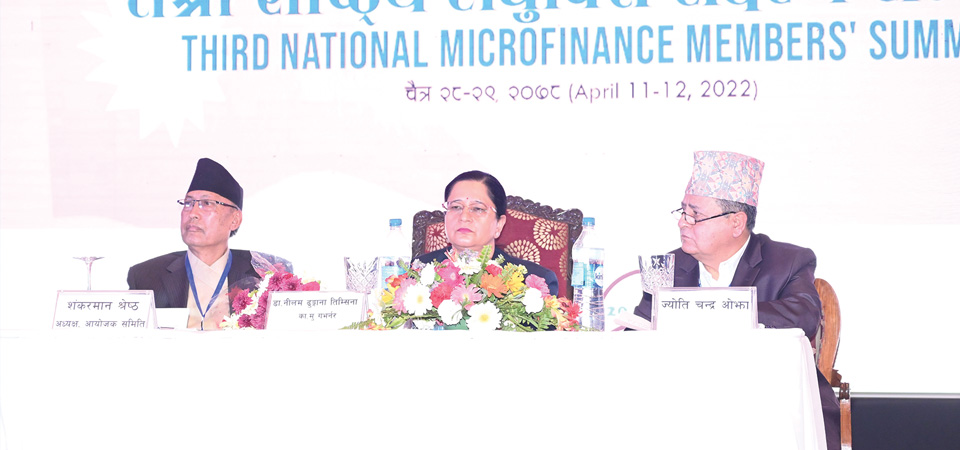'Microfinance vital for rural development'

By A Staff Reporter
Kathmandu, Apr. 12: The 3rd National Microfinance Members’ Summit kicked-off in Kathmandu Monday.
Inaugurating the summit, Acting Governor of Nepal Rastra Bank Dr. Neelam Dhungana Timsina said that microfinance was the foundation of rural development.
She said that microfinance had helped to rehabilitate the poor and the target community, reduce gender inequality, support women's empowerment and reduce economic inequality.
"Microfinance refers to financial services provided to a group of people deprived of financial services, which helps them to develop self-employment opportunities and expand various income-generating activities," she said.
"Despite the low participation of women in employment and income generation as compared to men, microfinance institutions have been playing an important role in the upliftment of rural women by involving them in productive activities and creating employment," she said.
Despite various efforts in Nepal for inclusive economic development, about 18 per cent of the country's population is still below the poverty line, she said.
With 20 per cent of the population still out of formal financial access, microfinance institutions are considered an effective means for poverty alleviation, economic inclusion and overall economic development, she said.
Services of MFIs have reached all 77 districts of the country and the number of branches in operation is 4,985.
As of mid-January 2022, the total number of members of MFIs was 5.622 million and out of them, the number of men was only 151,000. The number of women is 5.471 million.
The number of members taking loans from MFIs is 3.171 million, of which 83,000 are men and 3.088 million are women.
However, due to lack of ownership of property by women, there is a lack of collateral for loans required by women to start various businesses, she said.
"Out of the total male population, 56 per cent men have access to finance while only 36 per cent of the total population of women have access to finance. Women's access to and control over economic resources is also very low," she said.
Chairman of Centre for Self-help Development (CSD) and conference organising committee Shankar Man Shrestha stressed on the need of reducing poverty to zero from microfinance as 18 per cent of the population is still below the poverty line.
He said that the same person had taken loans from many microfinance institutions and that it should be tightened.
“Microfinance institutions seem to be in the race to make a profit. But, that is not the significance of microfinance," he said.
Stating that the culture of microfinance services is declining, he urged for correction in time.
Recent News

Do not make expressions casting dout on election: EC
14 Apr, 2022
CM Bhatta says may New Year 2079 BS inspire positive thinking
14 Apr, 2022
Three new cases, 44 recoveries in 24 hours
14 Apr, 2022
689 climbers of 84 teams so far acquire permits for climbing various peaks this spring season
14 Apr, 2022
How the rising cost of living crisis is impacting Nepal
14 Apr, 2022
US military confirms an interstellar meteor collided with Earth
14 Apr, 2022
Valneva Covid vaccine approved for use in UK
14 Apr, 2022
Chair Prachanda highlights need of unity among Maoist, Communist forces
14 Apr, 2022
Ranbir Kapoor and Alia Bhatt: Bollywood toasts star couple on wedding
14 Apr, 2022
President Bhandari confers decorations (Photo Feature)
14 Apr, 2022











